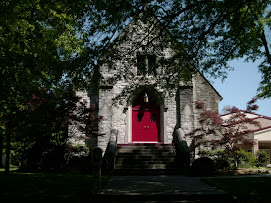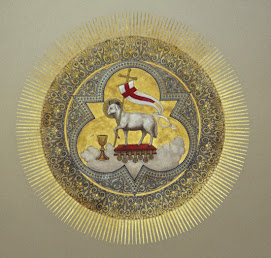THE AUGSBURG CONFESSION - “CHIEF ARTICLES OF FAITH” - ARTICLE X — THE LORD’S SUPPER
Our churches teach that the body and blood of Christ are truly present and distributed to those who eat the Lord’s Supper (1 Corinthians 10:16). They reject those who teach otherwise. +
Dear Brothers and Sisters in Christ our Lord . . . Herewith I am continuing the newsletter series which was started last year; I commend this article to the members of our congregation so that they/we may better know what it means to be Lutheran. I commend this article to other readers of this newsletter who might be curious to know what Lutheran’s believe.
The Augsburg Confession was written in the year of our Lord 1530 and was presented to Emperor Charles V as a statement of the chief articles of the Christian faith as understood by Lutherans. It was intended to show anyone who read it that the Lutherans were NOT just making up what they believed as they went along, but that they held to the true, Biblical Christian faith.
The Augsburg Confession, then, becomes one of the writings to which we point people who want to know “What IS Lutheran, anyhow?” . . .
+ + +
ARTICLE IX: THE LORD’S SUPPER
It is a sad truth that the Lord’s Supper has come to be widely misunderstood. And with the misunderstanding have come practices which do NOT honor God’s Word nor do they properly serve the souls for whom Christ died. In the days of the Reformers, Luther and others were upset about some of the practices of the Catholic Church. The business of having people “hire” priests to perform private “masses” (Communion services — at some of which there were not even any communicants present besides the priest — which were thought to somehow merit “time off” from the time which would have to be spent in purgatory (another false teaching for another discussion) was rejected by the reformers. The practice of the Corpus Christi procession/parade was rejected. The notion that it was the priest’s “indelible character” which made him able to turn the bread into the Christ’s body and the wine into Christ’s blood was also rejected. The Lutherans rejected the notion that, in the worship service, Jesus was being somehow “resacrificed” in the Lord’s Supper.
But the Lutherans did not reject everything which the Catholic Church taught about the Lord’s Supper. The Lutherans agreed, on the basis of God’s holy Word, that whoever goes to Holy
Communion does most certainly receive Christ’s body and blood; so they were careful to reject the false teaching of those who came to say that Communion only symbolized Christ’s body and blood. They also rejected, then, those false practices which arose from that false theology: the substitution of elements, the giving of the Sacrament to just anyone, the lack of instruction about
the Sacrament, seeing it as our gift to God (v. His gift to us to feed and sustain our spiritual lives), etc.
+ + +
HOW TO GET IN TROUBLE WITH COMMUNION, #1 . . .
The number one way to get yourself to thinking improperly about Holy Communion is to try to answer the question: “HOW does it become Christ’s body and blood?” In order to answer this question, we have to become speculative since Holy Scripture simply does not answer the question.
Whenever we decide that we will appeal to our own wisdom or rationalization in order to answer that question, we end up getting in trouble. In the Catholic Church, the question is answered by saying something to the effect that, when the priest with his indelible character speaks the words of institution over the elements, the bread ceases to be bread and is transformed into the body of Christ. Ditto with the wine which is transformed into the blood of Christ. If it is, then, the body and blood of Christ, there are different false practices which can arise out of that understanding. The Lutherans agree that in Holy Communion the communicant truly does receive the Body and Blood of Christ; however, Lutherans seek to avoid the question of “How?” and thus also seek to avoid the false practices which could come from the answer to that question.
Similarly, there were others who “broke” from the Catholic Church in the days of the Reformation who answered the “How?” of Christ’s presence in the Sacrament by saying that He is not present at all. Rather, they said, because we cannot perceive how He could possibly be resent, He is not really present; the bread and wine are only symbols (reminders) of His body and blood. That understanding gives rise to a whole other set of false practices.
+ + +
HOW TO GET IN TROUBLE WITH COMMUNION, #2 . . .
The other way to get in trouble with the Biblical teaching about the Lord’s Supper is to make the assumption that the Lord’s Supper is the OUR (or the congregation’s or the denomination’s) supper! This is a terrible error. To be sure, the Lord’s Supper is Christ’s gift to the Church, and the Church (the local congregation) is supposed to dispense it properly; HOWEVER, the Lord’s Supper does NOT in any way, shape, or form belong to the Church.
Whenever churches (local congregations) decide that Holy Communion belongs to them to do with as they see fit, they begin to think that they can change how it will be distributed, to whom it should be given, when it may be offered, etc.
Please be totally clear on this point: the Lord’s Supper belongs to the Lord. It comes from the Lord. It is one of the means by which the Lord delivers Himself to us. It is NOT ours to decide how we will change it or adapt it. The Christian Church (and her pastors/ministers) is only a steward of the gifts and mysteries of God.
+ + +
THE LORD’S SUPPER AS OUR FOOD (“IS IS IS, AND ALWAYS IS IS.”)
When you finally clear away all of our attempts at rationalization and of our own explanations of the Holy Supper, and when you finally get past the idea that the Supper somehow belongs to
us to do with as we please, then you finally get to how the Lutherans did — and still do!
— view the Lord’s Supper. The Lord’s Supper is a Meal which the Lord uses to feed His Church.
Lutherans sometimes employ the sentence, “Is is is and always is is.” as a way of teaching what we receive from Christ in His Supper. When Jesus said “This is My body . . . ,” He said that it is His body. When He said “This cup is the new covenant/testament in My blood . . . ,” He meant that this is His blood!
His Supper is our food. We gladly eat and drink. We eat and drink properly prepared (for to eat and drink improperly prepared is to eat and drink to our spiritual harm). And with His Body and Blood we are forgiven our sins, and sustained in the Christian faith.
Since, then, this supper is God’s gift to us and it is food for our souls, we gladly and humbly
receive it. We obey what Scripture says about how to prepare for it. With glad and joyful hearts,
we receive it often, clearing out of our lives those things which would prevent us from receiving it properly.
+ + +
THE LORD’S SUPPER IS . . . FOR YOU!
This Supper is for you. It gives the forgiveness of sins. It strengthens faith. It gives us strength for living the sanctified Christian life. Therefore we cherish the Supper and prepare others so that they may receive it properly as well. Thanks be to God for His wonderful gifts which sustain our spiritual lives! 1 Corinthians 10:16! +
Pastor Wollenburg
In Concordia The Lutheran Confessions A Reader’s Edition of the Book of Concord, there is this “forward” which is intended to help first time readers of the Augsburg Confession understand
the context in which it was written: By the time of the Augsburg Confession was written, deep divisions had arisen among the various reformers concerning the Lord’s Supper. The Lutherans were very careful to distance themselves from those who reject that the body and blood of Christ are in fact truly present in His Supper and distributed to all those who eat and drink.
Transubstantiation, consubstantiation, or any other human speculation asks the wrong question: how is Christ present? Lutheranism has no theory or philosophical explanation of how Christ is present.
Rather, Lutherans insist on answering the what of the Lord’s Supper. We believe, teach, and confess that of the bread, Christ said, “This is My body,” and of the wine, “This is My blood.” These are given and shed “for the forgivenes of sins” (Matthew 26:26-28). We reject any teaching that is contrary to our Lord’s Word. (See also Ap X; SA III VI; LC V; FC Ep VII and SD VII.)
(Source: CONCORDIA The Lutheran Confessions A Reader’s Edition of the Book of Concord. p. 60. © 2005, CPH, St. Louis, MO.)





